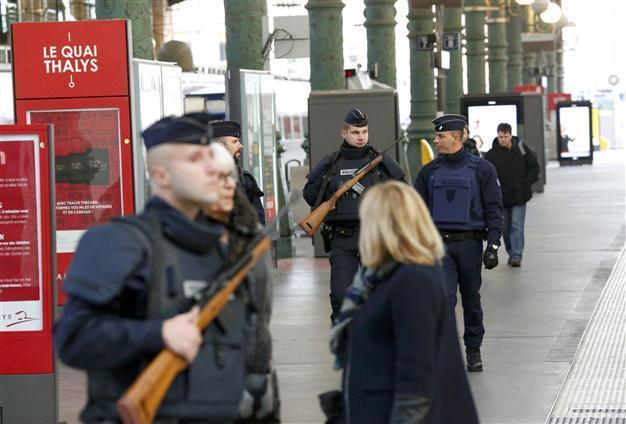NEWS ANALYSIS: Paris attack shows a joint strategy is needed to fight ISIL
Murat Yetkin

Police patrol the Gare du Nord train station the morning after a series of deadly attacks in Paris, Nov 14. Reuters photo
Paris was hit Nov. 13 by a terrible terrorist attack by militants of the Islamic State of Iraq and Levant (ISIL) that killed at least 128 and wounded 180.
Just 10 months ago, another radical Islamist group, al-Qaeda, hit Paris in an attack on the Charlie Hebdo magazine and killed 12 people.
French President François Hollande has condemned the attack as an “act of war,” declaring a state of emergency while asking for solidarity.
ISIL, which hit Paris last night, hit the Turkish capital Ankara when two suicide bombers blew themselves up in the middle of people gathering for a peace rally on Oct. 10 in the worst terrorist attack in Turkey. The attack resulted in the death of 102 people.
In between these attacks, there was the Russian passenger plane crash on Nov. 4, which killed 224 people, with ISIL claiming that it brought the plane down.
It is clear that the ISIL (and similarly the al-Qaeda-affiliated groups) are targeting the countries that are fighting them in Syria and Iraq, and it seems the fight is no longer limited to there.
Two major attacks in Turkey, for example, the one in Ankara and the suicide bombing in Suruç that killed 34 people, took place after Turkey went into full cooperation with the U.S.-led coalition against ISIL, by opening up of its strategic air base of İncirlik.
U.S. President Barack Obama said the Paris attacks aimed at “spreading the fear” by terrorists. Vladimir Putin of Russia asked for “unity against terrorism” and Turkish President Tayyip Erdoğan said Turkey would keep up with “resolute stance against terrorism.”
France was among the countries (along with the U.S. and Turkey) which carried out air strikes against ISIL there in October. On Nov. 13, a few hours before the attack, the French government announced that aircraft carrier Charles de Gaulle was to leave its port in Toulon to go to the Persian Gulf in order to contribute more to the fight against ISIL. The Russian Air Force, which was deployed in Syria in late September, started to hit ISIL targets heavily after Western criticism that they were actually hitting forces against the Bashar al-Assad regime there.
The Paris attack was committed a day before an important meeting in Vienna today, on Nov. 14, about the future of Syria; the fight against ISIL and the role of al-Assad. On Nov. 15, world leaders were to discuss the Syrian crisis with its terrorism and migration dimensions at the G-20 Summit hosted by Erdoğan in Antalya.
Erdoğan reiterated in a CNN International interview on Nov. 12 that without establishing safe zones in Syria, it was not possible to find a viable solution to migration or terrorism. Safe zones would only be possible with an international consensus; with or without a U.N. resolution, with the consent of Russia, the major protector of the al-Assad regime in Syria, which has been in a terrible civil war since 2011. And with or without safe zones, the world leaders have to find a way as soon as possible to develop a joint strategy to fight ISIL and similar militant-Islamist groups such as al-Qaeda and its affiliates.
It was almost clear after the Ankara and Sinai incidents, that ISIL would spread its attacks outside Syria and Iraq, with the concerns unfortunately proving true in the Paris attack. This is no longer a fight within the boundaries of the Middle East and Mesopotamia. This is no longer a fight that can be dealt with air strikes and so-called “moderate” locals on the ground with the high possibility of turning “radical” as soon as they get the money and the weapons. There is no need to repeat Afghanistan and Iraq in Syria. Such a strategy must have political and psychological dimensions in addition to military ones.
Perhaps the leaders should first assume that things will never be the same again; a reset is needed.
